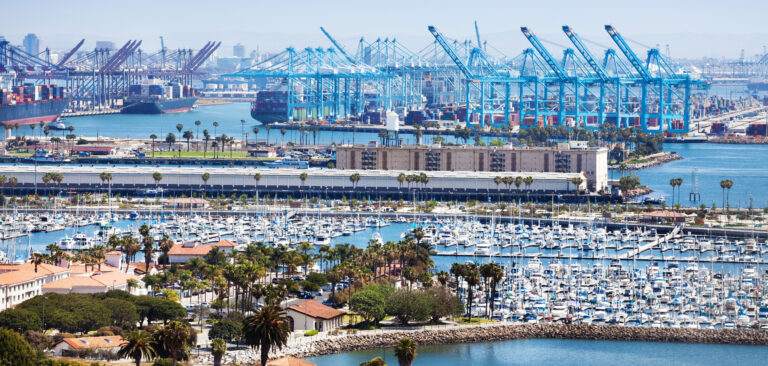On June 9, 2022, the Port of Long Beach signed on to the Shanghai-Los Angeles Green Shipping Corridor, a partnership of C40 Cities, ports, shipping companies and cargo owners that aims to create a zero-emissions trans-Pacific trade route.
The Green Shipping Corridor was first announced in January by C40 Cities, the ports of Shanghai and Los Angeles and key maritime stakeholders. The project will aid in decarbonizing shipping between busy ports in China and the United States. C40 Cities is a network of leading international cities that are working on initiatives to tackle the climate crisis.
By the end of 2022, the partnership intends to develop a Green Shipping Corridor Implementation Plan, which will include goals, deliverables, milestones and roles.
Key decarbonization goals for the partnership include phasing in low-, ultra-low, and zero-carbon-fueled ships over the coming decade, such as the world’s first zero-carbon trans-Pacific container ship. The group will also develop the best management practices to help reduce emissions and improve efficiency for all ships using the international trade corridor. Furthermore, it will reduce supply chain emissions produced from port operations in Shanghai, Los Angeles and Long Beach.
“This initiative builds on important efforts our port participates in, including the World Ports Climate Action Program, an international commitment to develop projects to address global warming and meet the goals outlined in the Paris Agreement,” said Mario Cordero, executive director of the Port of Long Beach. “It also complements the Clean Air Action Plan and supports our shared goals to reduce carbon emissions and advance technologies – especially for vessels, which are our largest source of emissions.”
“Accelerating efforts to decarbonize the shipping sector is urgent if we are to limit global heating to 1.5°C,” said Mark Watts, executive director of C40 Cities. “By convening a powerful coalition that includes the San Pedro Bay ports complex, the Port of Shanghai and key maritime industry stakeholders, we hope to be an important catalyst in decarbonizing supply chains of all kinds around the world, while also creating a replicable model for other port cities to follow.”
“The Port of Long Beach has an arsenal of environmental initiatives, with an ultimate goal of reaching zero-emission terminal operations by 2030 and truck operations by 2035,” added Steven Neal, president of the Long Beach Harbor Commission. “Joining the Green Shipping Corridor extends our influence outside of our own city, seeks to decarbonize shipping operations and reinforces our commitment to balancing economic activity with sustainability.”



